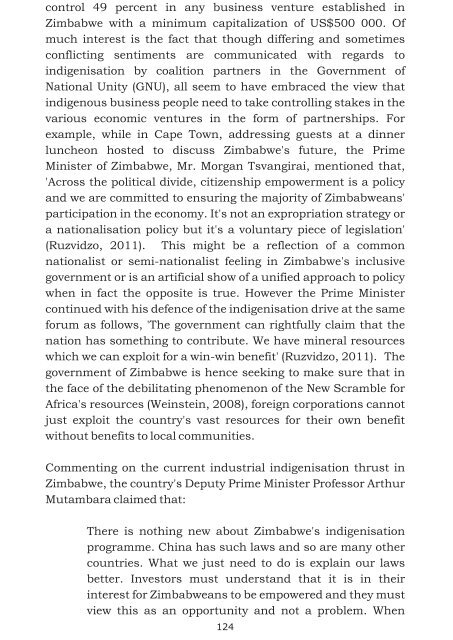Beneficiaries are actors too.pdf - Southern Institute of Peace ...
Beneficiaries are actors too.pdf - Southern Institute of Peace ...
Beneficiaries are actors too.pdf - Southern Institute of Peace ...
Create successful ePaper yourself
Turn your PDF publications into a flip-book with our unique Google optimized e-Paper software.
control 49 percent in any business venture established in<br />
Zimbabwe with a minimum capitalization <strong>of</strong> US$500 000. Of<br />
much interest is the fact that though differing and sometimes<br />
conflicting sentiments <strong>are</strong> communicated with regards to<br />
indigenisation by coalition partners in the Government <strong>of</strong><br />
National Unity (GNU), all seem to have embraced the view that<br />
indigenous business people need to take controlling stakes in the<br />
various economic ventures in the form <strong>of</strong> partnerships. For<br />
example, while in Cape Town, addressing guests at a dinner<br />
luncheon hosted to discuss Zimbabwe's future, the Prime<br />
Minister <strong>of</strong> Zimbabwe, Mr. Morgan Tsvangirai, mentioned that,<br />
'Across the political divide, citizenship empowerment is a policy<br />
and we <strong>are</strong> committed to ensuring the majority <strong>of</strong> Zimbabweans'<br />
participation in the economy. It's not an expropriation strategy or<br />
a nationalisation policy but it's a voluntary piece <strong>of</strong> legislation'<br />
(Ruzvidzo, 2011). This might be a reflection <strong>of</strong> a common<br />
nationalist or semi-nationalist feeling in Zimbabwe's inclusive<br />
government or is an artificial show <strong>of</strong> a unified approach to policy<br />
when in fact the opposite is true. However the Prime Minister<br />
continued with his defence <strong>of</strong> the indigenisation drive at the same<br />
forum as follows, 'The government can rightfully claim that the<br />
nation has something to contribute. We have mineral resources<br />
which we can exploit for a win-win benefit' (Ruzvidzo, 2011). The<br />
government <strong>of</strong> Zimbabwe is hence seeking to make sure that in<br />
the face <strong>of</strong> the debilitating phenomenon <strong>of</strong> the New Scramble for<br />
Africa's resources (Weinstein, 2008), foreign corporations cannot<br />
just exploit the country's vast resources for their own benefit<br />
without benefits to local communities.<br />
Commenting on the current industrial indigenisation thrust in<br />
Zimbabwe, the country's Deputy Prime Minister Pr<strong>of</strong>essor Arthur<br />
Mutambara claimed that:<br />
There is nothing new about Zimbabwe's indigenisation<br />
programme. China has such laws and so <strong>are</strong> many other<br />
countries. What we just need to do is explain our laws<br />
better. Investors must understand that it is in their<br />
interest for Zimbabweans to be empowered and they must<br />
view this as an opportunity and not a problem. When<br />
124


